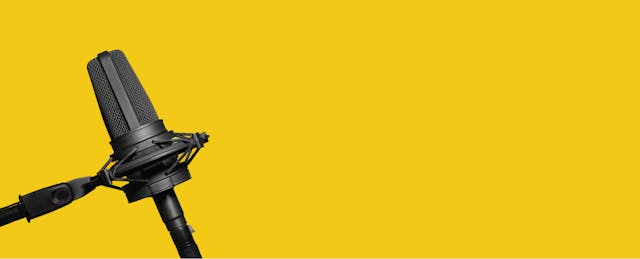Every week we publish a new episode of our EdSurge Podcast about the future of learning, a way to hear the voices of students, educators and leaders as they puzzle out some of the thorniest issues facing education.
In 2021, we told the story of a student who was surprised to learn that the professor featured in his online course lecture videos died years ago. We heard from a college president who moved into a dorm on his campus during a COVID-19 lockdown to learn more about the mental-health challenges students face. And we heard from a K-12 teacher who was among the thousands of U.S. educators that lost their gigs tutoring students in China online once that country put in new restrictions against such businesses.
As the year winds down, we’re highlighting the 10 episodes that got the most listens this year.
Three themes emerged. One is that people are interested in how new technologies coming out might impact education. For instance, one of our most popular episodes looked at whether NFTs could have a role in classrooms and educational systems. And we also looked at whether home robots could come to classrooms, and that one made the list as well.
The second theme was an interest in improving diversity, equity and inclusion efforts in education. We had a couple of popular episodes about antiracism, and that’s a topic we’ll continue to cover in the year ahead.
And last but not least, listeners gravitated to episodes we did that revisited the history of longstanding educational narratives and looked how we got here. In fact, our most popular episode of the year was about the strange and messy history of gifted and talented programs in the U.S.
Most set out to bring you voices you might not have heard before. But some big names got the most listens, including our interviews with civil rights pioneer and longtime university president Freeman Hrabowski, with emeritus president of Columbia University's Teachers College Arthur Levine and with prominent edtech critic Audrey Watters.
Below are the 10 top episodes of 2021 as voted by listeners. If you missed any of these or want to follow us into 2022, please subscribe on Apple Podcasts, Overcast, Spotify, Stitcher or wherever you listen to podcasts.
10. Should Robots Replace Teachers?

Robots are having a moment—including the announcement this year of a new home robot by Amazon. What could that mean for education? We talked with Neil Selwyn, a research professor at Monash University in Australia and author of the provocative book "Should Robots Replace Teachers?"
9. How Antiracism Work is Changing Early Childhood Education

Little kids are curious about race and difference. So how are teachers preparing children to develop positive social identities, encouraging their self-expression and helping them feel comfortable and safe? We talked with Calvin Moore Jr., CEO of the Council for Professional Recognition, which administers the Child Development Associate National Credentialing Program, the most widely-used credential in early childhood education.
8. Why The Coming ‘Upheaval’ in Higher Ed May Change Notions of Equity, and Prestige

Changes are coming to higher education, and those changes will be bigger and more disruptive than many college leaders and experts realize as online learning grows. That’s the view of longtime education leader Arthur Levine, in a new book called “The Great Upheaval: Higher Education’s Past, Present, and Uncertain Future.” And that means it's time to think differently about equity.
7. Could NFTs Play a Role in Education?

There’s all this buzz this year about NFTs, with artists using the blockchain-based format to sell digital works that are getting snapped up by collectors for hundreds of thousands of dollars. Some students and educators have been experimenting with the tech too, and some say they could make a big splash.
6. The Tyranny of Letter Grades

Our current grading system can be a way for kids to prove themselves and win college scholarships, or admission to selective colleges. It can also be a barrier, in sometimes surprising ways. What might a world without letter grades and GPAs look like? In this installment of our ongoing Bootstraps series on educational equity, I requested my own college admission file to explore the outsize role grades can play.
5. We Know How to Diversify STEM Fields. The Challenge is Spreading What Works.

Freeman Hrabowski is a college president who has long fought for civil rights and racial justice. When he was 12 years old he marched with Martin Luther King Jr. in Birmingham, Alabama—and got arrested. His program to help students major and persist in STEM fields has been shown to work, and several colleges are trying to replicate it.
4. What the Maps in Our Brain Tell Us About the Learning Process

To fit all the billions of neurons in the human brain into our heads, they're organized so that brain regions are carefully mapped to things like vision and hearing. And understanding those maps can be a key to better understanding how the mind—and how learning—works, according to Rebecca Schwarzlose, a postdoctoral neuroscientist at Washington University in St. Louis, and author of the new book, “Brainscapes.”
3. How to Continuously Improve Teaching

Learning science is always advancing, yielding new insights about how people gain and retain knowledge and skills. How can classroom teachers keep up—and even conduct their very own research to improve their instruction, day-by-day and week-by-week? This episode capped off our series on the concept of “learning engineering.”
2. The Long and Surprising History of ‘Teaching Machines’

People don’t talk much today about early teaching machines, some of which were made out of wood and brass. And that’s no accident, according to Audrey Watters, a longtime critical observer of edtech who is out with a new book called “Teaching Machines: The History of Personalized Learning.” On this episode, we’re dusting off these old teaching machines from all the way back to the 1920s, to see what these low-tech devices can teach us about education today.
1. The Strange Past and Messy Future of 'Gifted and Talented’

Sometime early in elementary school, kids are put on one of two paths: regular or gifted. Where did this idea come from? The answer goes back more than a 100 years, to a once-famous scholar named Lewis Terman. And it turns out his legacy, and the future of gifted programs, are still very much under debate. This is also part of our Bootstraps podcast series.


